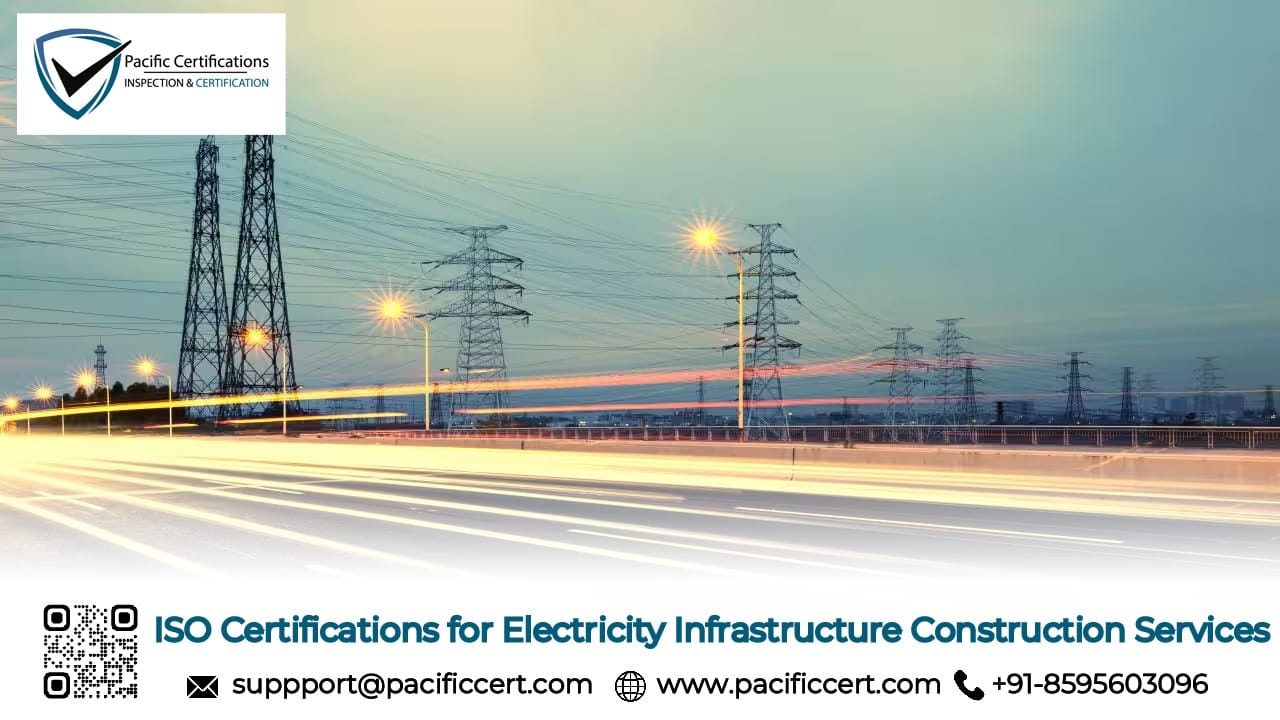ISO Certifications for Electricity Infrastructure Construction Services Businesses, Requirements and Benefits

Introduction
Electricity infrastructure construction services operate in high-stakes environments where technical precision meets unforgiving safety demands. These businesses build transmission lines spanning vast distances, construct substations managing high-voltage distribution, install underground cable networks, erect utility towers reaching dangerous heights, and commission electrical systems powering entire communities while navigating electrical hazards, working at extreme elevations, and managing complex regulatory frameworks governing power grid reliability.
ISO certifications have become essential frameworks for electrical contractors confronting intensifying scrutiny from international regulatory standards governing workplace safety, environmental protection, and asset reliability. Global compliance frameworks including electrical safety codes, occupational health regulations, and energy infrastructure standards require documented systems demonstrating hazard control, quality assurance in installations, and systematic risk management throughout project lifecycles from design through commissioning. These certifications provide the comprehensive methodology electrical construction businesses need to protect workers while delivering infrastructure meeting stringent performance requirements.
"In electrical construction, safety is not negotiable—every voltage level, every elevation, and every procedure demands systematic controls preventing catastrophic consequences."
Quick Summary
ISO certifications provide electricity infrastructure construction services with internationally recognized frameworks to manage service quality through ISO 9001, occupational health and safety through ISO 45001, asset management through ISO 55001, and environmental impacts through ISO 14001. These standards address critical challenges specific to electrical construction operations, including preventing electrocution and arc flash incidents through systematic hazard controls, ensuring transmission line and substation installations meet technical specifications, maintaining worker safety during high-voltage testing and energization, and managing environmental impacts from construction activities across sensitive corridors and protected areas.
For more information on how we can assist your electricity infrastructure construction business with ISO certifications, contact us at [email protected].
Applicable ISO Standards for Electricity Infrastructure Construction Services Businesses
Below are the most relevant ISO standards applicable to transmission line contractors, substation builders, electrical distribution installers, and utility infrastructure construction companies:
ISO 9001: Quality Management Systems
ISO 9001 ensures electrical installations meet technical specifications, design standards, and performance requirements through systematic quality controls covering material procurement, construction methodologies, testing protocols, and commissioning procedures essential for reliable power infrastructure.
ISO 14001: Environmental Management Systems
Electricity infrastructure construction impacts sensitive environmental corridors through vegetation clearing, erosion risks, habitat disruption, and visual impacts, requiring systematic environmental management addressing waste disposal, spill prevention, restoration obligations, and regulatory compliance throughout construction phases.
ISO 45001: Occupational Health and Safety Management Systems
This standard addresses critical electrical construction risks including electrocution during energized work, arc flash exposure during testing and commissioning, falls from transmission towers and utility poles, and heavy equipment accidents, establishing systematic hazard identification, risk assessment, and control measures protecting workers in high-danger environments.
For companies managing large-scale infrastructure projects, ISO 55001 offers a framework to optimize asset performance and lifecycle. This standard helps ensure that assets like power lines and substations remain reliable and cost-effective throughout their lifespan.
ISO 50001: Energy Management Systems
Transmission lines, substations, and distribution networks represent substantial long-term investments requiring optimized lifecycle management, making asset management systems essential for maximizing infrastructure performance, reliability, and value throughout decades of operational service.
ISO 27001: Information Security Management Systems
With the growing reliance on technology, ensuring data security is critical. ISO 27001 helps protect sensitive project data, such as design blueprints and operational details, from cyber threats and unauthorized access.
Complex electrical infrastructure projects involving multiple contractors, strict timelines, and coordination with utility operations require systematic project management frameworks ensuring schedule adherence, resource allocation, stakeholder coordination, and change management throughout construction lifecycles.
Click here to find out more applicable standards to your industry
What are the Requirements of ISO Certifications for Electricity Infrastructure Construction Services Businesses?
Electricity infrastructure construction services seeking ISO certification must establish and maintain documented policies, procedures, and records aligned with the selected ISO standards. Key requirements include the following:
ISO 45001:2018 – Occupational Health and Safety Management Systems
Conduct comprehensive hazard identification covering electrical shock risks, arc flash exposure, fall hazards, and equipment operation
Implement electrical safety work practices including lockout-tagout procedures, voltage testing protocols, and energized work permits
Establish fall protection systems for transmission tower climbing and elevated substation work including harnesses and rescue plans
Provide personal protective equipment including arc-rated clothing, insulated gloves, hard hats, and safety glasses
Develop emergency response procedures for electrical injuries, falls, equipment accidents, and medical evacuations from remote sites
Maintain safety training records documenting electrical hazard awareness, high-voltage procedures, and rescue techniques
ISO 9001:2015 – Quality Management Systems
Define project scope covering transmission line construction, substation installation, distribution network building, and underground cable laying
Implement documented quality management system outlining design review, material inspection, construction supervision, and testing protocols
Establish technical specification compliance procedures ensuring installations meet voltage ratings, clearances, and performance standards
Conduct inspection and testing activities including insulation testing, grounding verification, and commissioning validation
Maintain documented procedures for handling design changes, construction defects, and commissioning failures
Train personnel on electrical codes, installation standards, quality control procedures, and technical specifications
ISO 55001:2014 – Asset Management
Establish strategic asset management objectives aligned with infrastructure reliability, performance, and lifecycle value optimization
Implement asset lifecycle planning addressing design life, maintenance strategies, replacement timing, and end-of-life disposal
Conduct risk assessments identifying failure modes, consequences, and mitigation strategies for critical infrastructure assets
Develop performance monitoring systems tracking asset condition, reliability metrics, and maintenance effectiveness
Maintain stakeholder engagement processes coordinating with utilities, regulators, and communities throughout asset lifecycles
Document decision-making frameworks balancing costs, risks, and performance throughout infrastructure investment cycles
ISO 14001:2015 – Environmental Management Systems
Identify environmental aspects including vegetation clearing, soil disturbance, erosion potential, and waste generation from construction
Implement erosion and sediment control measures protecting waterways during excavation and grading activities
Establish waste management procedures for proper disposal of contaminated soil, insulating fluids, and construction debris
Conduct environmental compliance monitoring ensuring adherence to permits, regulations, and restoration requirements
Maintain spill prevention and response procedures addressing fuel, oil, and transformer fluid releases
Document habitat restoration plans reestablishing vegetation and protecting sensitive species following construction completion
ISO 31000:2018 – Risk Management
Establish risk management framework addressing safety, technical, environmental, schedule, and financial project risks
Implement safety risk controls including voltage verification, clearance maintenance, and coordination with utility operations
Conduct technical risk assessments evaluating design adequacy, geotechnical conditions, and equipment specifications
Maintain schedule risk management addressing weather delays, equipment availability, and permitting uncertainties
Document stakeholder risk mitigation strategies managing community concerns, landowner access, and regulatory approvals
Establish contingency planning for project disruptions including severe weather, equipment failures, and workforce shortages
Tip: Integrate safety, quality, and asset management systems using unified documentation platforms that simultaneously address ISO 45001 electrical hazard controls, ISO 9001 installation quality requirements, and ISO 55001 asset performance objectives, creating comprehensive management frameworks demonstrating operational excellence to utility clients increasingly requiring multi-standard certification for contractor prequalification and long-term partnership consideration.
For more information on how we can assist your electricity infrastructure construction business with ISO certifications, contact us at [email protected].
What are the Benefits of ISO Certifications for Electricity Infrastructure Construction Services Businesses?
ISO certifications deliver substantial operational and competitive advantages for electrical infrastructure operations, from enhanced safety performance to utility client confidence, listed below are the key benefits for the ISO standards applicable to transmission line contractors, substation builders, electrical distribution installers, and utility infrastructure construction companies:
Improved worker safety and reduced incident rates through systematic hazard identification, electrical safety protocols, and fall protection systems preventing electrocution, arc flash injuries, and fatal accidents in high-voltage environments
Stronger utility client confidence and contract opportunities as certification demonstrates commitment to safety, quality, and reliability required for managing critical power infrastructure projects
Better installation quality and technical compliance through standardized construction procedures, testing protocols, and quality controls ensuring infrastructure meets performance specifications and regulatory codes
Enhanced asset performance and lifecycle value when systematic asset management optimizes infrastructure reliability, maintenance effectiveness, and long-term value throughout decades of operational service
Higher operational efficiency and project profitability resulting from optimized workflows, reduced rework, systematic risk management, and improved resource allocation lowering construction costs
Greater regulatory compliance confidence maintaining documented evidence satisfying electrical codes, environmental regulations, and occupational safety requirements during inspections and audits
Reduced liability from workplace accidents and quality failures demonstrating systematic controls and professional practices preventing regulatory penalties, litigation exposure, and insurance premium increases
Increased competitive positioning for major projects as utility and government clients increasingly mandate ISO certification in contractor prequalification and proposal evaluation criteria
Streamlined project management and coordination when documented systems improve communication, change management, and stakeholder engagement across complex multi-party infrastructure projects
Better environmental stewardship and community relations through systematic impact mitigation, restoration practices, and stakeholder engagement protecting company reputation in communities hosting infrastructure
The global electric power infrastructure market reached USD 303.71 billion in 2026 and projects continued growth to USD 407.89 billion in a few years, expanding at 6.9% compound annual growth rate driven by renewable energy integration requiring transmission expansion, grid modernization initiatives deploying smart technologies, urbanization demanding distribution network densification, and government infrastructure investments addressing aging electrical systems across developed and emerging markets. Power transmission line construction specifically targets USD 61.29 billion over the coming years at 7.26% annual growth as utilities invest in high-voltage direct current technology enabling efficient long-distance renewable energy transport and regional grid interconnection.
ISO-certified electrical contractors demonstrate 40-60% reductions in workplace incident rates through systematic safety management while achieving 20-25% lower operational costs and improved asset reliability when following ISO 55001 frameworks optimizing infrastructure performance throughout multi-decade lifecycles. Industry drivers include aging transmission and distribution infrastructure requiring replacement and retrofitting in developed markets, rapid electrification expanding grid access in emerging economies, renewable energy deployment necessitating grid strengthening and energy storage integration, digital transformation implementing sensors and automation throughout electrical networks, and stricter safety enforcement following high-profile electrical accidents intensifying regulatory scrutiny of contractor safety practices and qualification requirements.
How Pacific Certifications Can Help
Pacific Certifications, accredited by ABIS, acts as an independent certification body for electricity infrastructure construction services businesses by conducting impartial audits against applicable ISO standards. Our role is to objectively assess whether documented management systems and electrical construction practices conform to international ISO requirements, based strictly on verifiable evidence and operational records.
We support electricity infrastructure construction providers through:
Independent certification audits conducted in accordance with ISO/IEC 17021 standards
Practical assessment of real construction operations, safety controls, quality procedures, and asset management practices
Clear audit reporting reflecting conformity status and certification decisions based on documented evidence
Internationally recognized ISO certification upon successful compliance demonstration
Surveillance and recertification audits to maintain certification validity throughout the certification cycle
Technical guidance on interpreting ISO requirements within transmission line construction, substation installation, and electrical distribution contexts
If you need support with ISO certification for your electricity infrastructure construction business, contact us at [email protected] or +91-8595603096.
Author: Pushpinder K
Ready to get ISO certified?
Contact Pacific Certifications to begin your certification journey today!
Suggested Certifications –
Read more: Pacific Blogs

